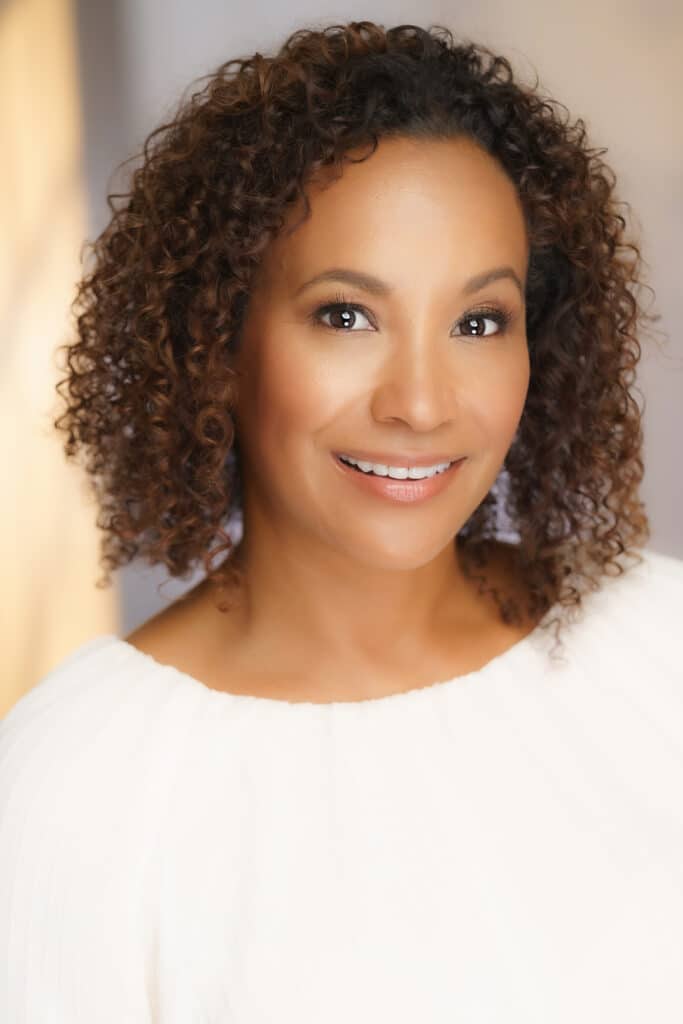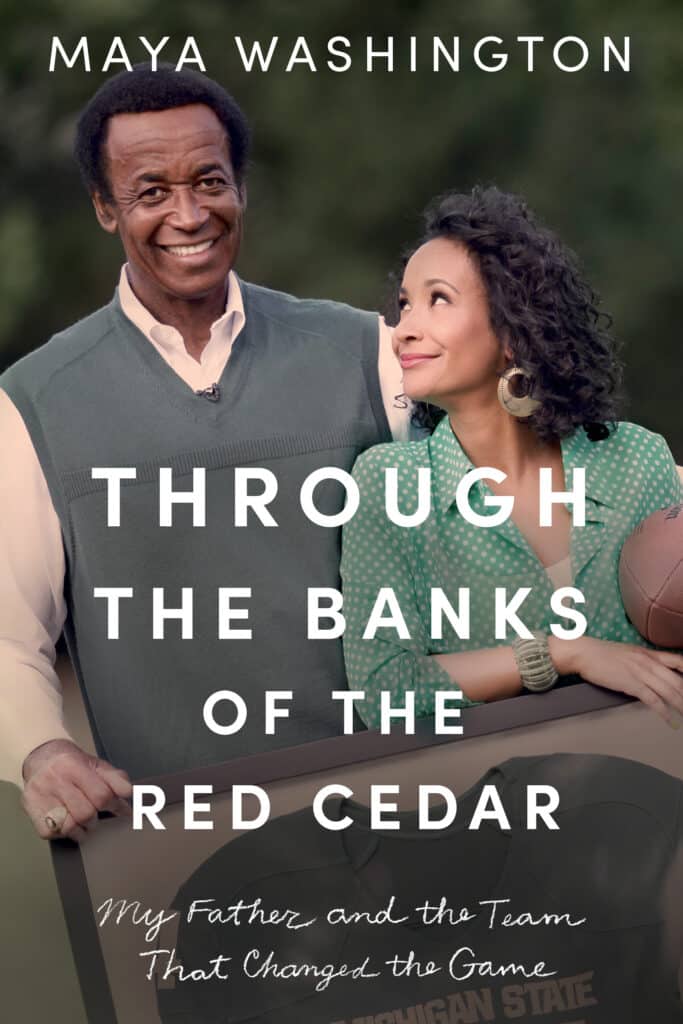Maya Washington, author of Through the Banks of the Red Cedar: My Father and the Team That Changed the Game
General Nonfiction Category, sponsored by The Duchess Harris Collection
Each week leading up to the 35th annual Minnesota Book Awards, we are featuring exclusive interviews with our finalists. You can also watch the authors in conversation with their fellow category finalists here.

Would you tell us one or two things about your finalist book that you are particularly proud of, and why?
My book, Through the Banks of the Red Cedar: My Father and the Team That Changed the Game, came after my documentary, Through the Banks of the Red Cedar (Big Ten Network2020, PBS 2022). The two are companion works that have impacted how audiences and readers think about the desegregation of college and professional sports. I’ve spent over ten years collectively on this journey and faced a lot of obstacles along the way. When I started the process in 2011, people weren’t as comfortable talking about race, and I knew very little about my father’s athletic career or his historical contributions. Devoting a significant amount of my life to this work has allowed me to create more awareness of the contributions of Black pioneers that preceded my father’s career, and the major historical events that unfolded as he made a better life for himself in the 1960s and 1970s. I was finishing up the final edits throughout the pandemic and in the midst of the unrest in Minneapolis in 2020, as well as during other major events in the U.S. in 2021, so seeing similar themes from the 1960s play out in my day-to-day life was especially surreal. In those difficult moments over the past few years, I came to understand the magnitude of my parents’ resilience with even more depth.
What advice would you give to an aspiring writer with an interest in your category?
The advice I remember when I was starting out as a writer was to write what you know and pursue the stories or subjects that you’re obsessed with. I think this can be daunting until you actually are compelled by something greater than yourself to sit down and bring the story forward as more than just an idea, and be brave enough to believe there’s value for yourself and others in doing so. I was compelled to pursue my father’s story because of what I didn’t know. The search for my own “true story” became an obsession. Nonfiction is more important than ever now, with artificial intelligence and virtual (if not distorted) reality growing rapidly. We need human storytellers because the alternative, an AI version of human history, really feels terrifying.
Learning more about my own history and sharing it with others has been cathartic, especially when I face challenges in my own life as a woman of color. I’m able to consider the sacrifices of my grandparents, and ancestors before them, and remember how far we’ve come. I’m better able to appreciate the access that I have, and also feel a sense of courage informed by their resilience. I’m buoyed to continue working toward a more inclusive society and be an instrument of peace and access for others in my field and in my community. My best advice is to find the pleasure in taking on a challenge, and be faithful to the story that wants to come through you.

Tell us about a favorite book. Why did you find it moving, influential, or otherwise memorable?
I always struggle to answer this question because there are many books that have served different seasons in my life. A. Van Jordan’s poetry collection M-A-C-N-O-L-I-A (W. W. Norton & Company, 2005) remains a favorite for me and seems resonant in this moment as I reflect on my memoir. The narrative and cinematic approach to A. Van Jordan’s collection was exciting to me as a young poet and writer when I encountered it shortly after it was released. The work has a stunning documentary feel that centers MacNolia Cox, the first African American finalist in the National Spelling Bee Competition in 1936. The language, composition, and narrative approach, spoke to various parts of me as a playwright, poet, and screenwriter, at that time. I imagine it influenced how I’ve found what I’d describe as containers for my work that have allowed me to write across genres and see narratives unfold on stage, on screen, and on the page. A. Van Jordan’s boundlessness, in how the intimate portrait of a young Black woman’s brilliance and potential was thwarted by racism and the social constructs of America during the Great Depression unfolds in M-A-C-N-O-L-I-A, influenced my understanding of how genre and form can be as naturally innovative and imaginative as Black American culture itself. Exposure to flexible and unbridled work has made it possible for me to focus more on what’s possible and less on what I’m allowed to do based on an ideal or a cannon that doesn’t apply to me or the stories I’m compelled to tell.
Tell us something about yourself that is not widely known.
This is a really difficult one. I’m a multi-disciplinary artist. Some in the literary community don’t know that I’m a filmmaker or that I got my start as a dancer and as an actor. I’m also a poet, dramatic writer, visualist, and arts educator. I’m a good cook. I’m also an introvert (with good social skills) but I love to be silly and I laugh at myself and life often. I create public art and have done a number of community projects and live events. I have a pretty big footprint, but those closest to me know I like to move quietly, especially in the Twin Cities. So, I have my hand in a lot of things and take joy in doing things behind the scenes that people don’t know about. It helps me balance the public side of my creative practice with the heart and soul of why I make art.
I believe a story tells you how it wants to be told, and there are so many ways to engage audiences whether through moving images, visual art, literature, or performance. I bring my best effort to everything I do because I care. I live with passion and purpose. My ancestors sacrificed so much for me that it’s hard for me to even consider “phoning it in.” I go above and beyond so that whoever is coming up behind me can hopefully benefit from my life being a graceful, albeit quirky, example of what a small brown woman can do and be.
The Minnesota Book Awards is a celebration of writers, readers – and libraries. We’d love if you would share thoughts about the role and value of libraries.
Libraries and high-integrity humans in this space are as critical as ever now. Literacy is power, and therefore under immense political and social pressure. As a child, access to my school and community libraries opened my imagination and affirmed my right to edification. Librarians and archivists are crucial to preserving and documenting history, especially in these times when there’s a push to erase the past and perpetuate false narratives for political or personal gain. The future of American culture is dependent on a critical commitment to preserving a truthful and ethical account of history. Critical thinking, ethics, and personal and professional integrity, are standards that libraries can inspire and uphold within communities even when the cultural trend is to move away from these fundamental values.
Maya Washington holds a B.A. from the University of Southern California and received an M.F.A. in Creative Writing from Hamline University. Maya’s poems and prose have appeared in numerous journals and have been widely anthologized. Her work has been staged by companies in Minneapolis and Chicago.

